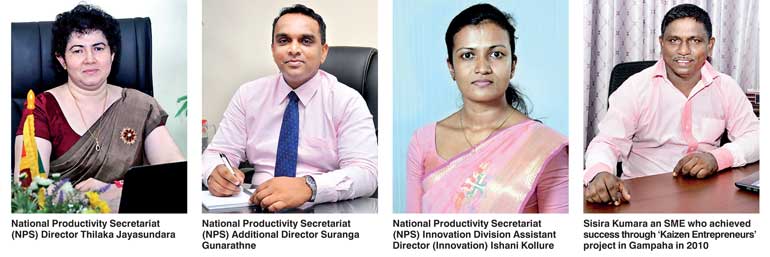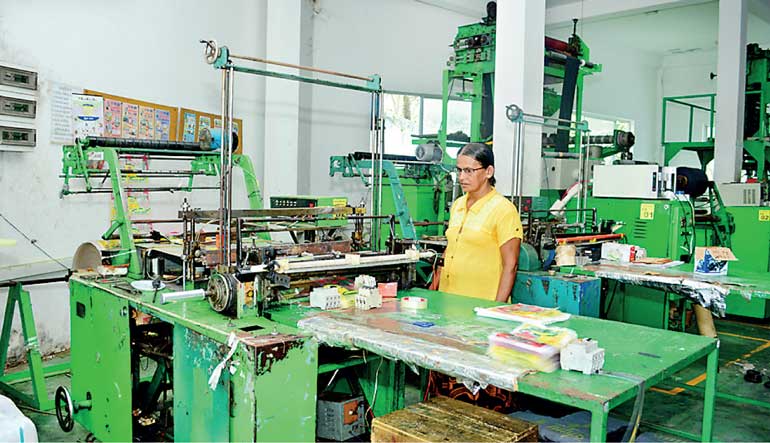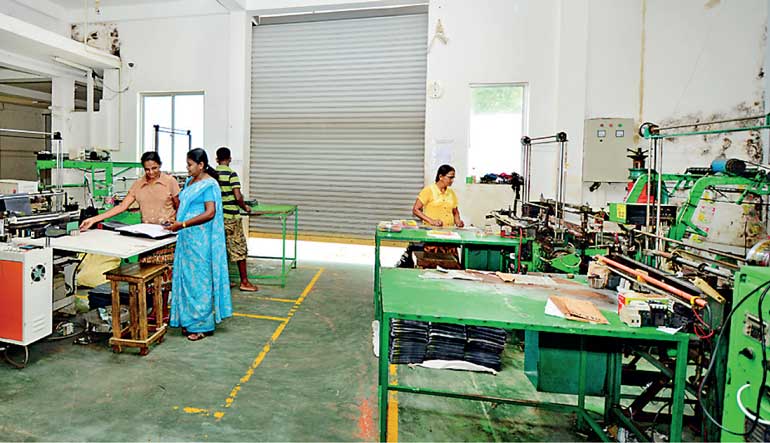Tuesday Feb 24, 2026
Tuesday Feb 24, 2026
Thursday, 9 June 2016 00:00 - - {{hitsCtrl.values.hits}}



A successfully installed poly-sac industrial facility following ‘Kaizen Entrepreneurs’ training program by the NPS
By Harsha Udayakantha Peiris
“We need to make sure the golden era of prosperity that Sri Lanka had during the period of Manawamma to Maha Parakramabahu dawns again. We must enter the right path for this to happen, with accountability, patience and commitment. Only then can we create a better country for our future generations and lift our country to the rightful place it deserves.” It is in this context that on 5 November 2015, Prime Minister Ranil Wickremesinghe made these special remarks as he delivered the policy statement to enumerate the platform for the budget 2016. The medium term strategies proposed in the statement consisted, generating one million employment opportunities, enhancing income levels, development of rural economies, ensuring land ownership to rural and estate sectors, the middle class and government employees and creating a wide and strong middle class.
Authoritative responsibility to boost productivity towards elevating national income
Based on these strategies today, the country has a dream to be another rainbow nation, a developed nation; a nation with an upbeat happiness index, a nation of prosperity, cascading with goodness and goodwill with a need to provide economic freedom for future generations to enjoy the fruits of commitment.
“We will ensure delivery of targets and goals set focusing on short, medium and long term strategies and confront structural development challenges to facilitate transition towards an upper middle income economy. In terms of the macroeconomic fundamentals, since unemployment among educated youth is considered being very high, the only way forward would be to increase productivity to achieve the stipulated growth of the country,” says National Productivity Secretariat (NPS) Director Thilaka Jayasundara.
The National Productivity Secretariat (NPS) is the national arm of the Asian Productivity Organization (APO) headquartered in Tokyo, Japan that funds and supports its implementations. Across the 20 APO member countries in the Asia-Pacific that include Bangladesh, Cambodia, People’s Republic of China, Fiji, India, Indonesia, Islamic Republic of Iran, Japan, Republic of Korea, Lao PDR, Malaysia, Mongolia, Nepal, Pakistan, Philippines, Singapore, Sri Lanka, Thailand and Vietnam, international benchmarking on the competitiveness of member economies is marked through a range of results and findings regarding what has supported and hindered competitiveness.
Of particular note is that a review of the three lowest-ranking pillars in individual APO member economies reveals a certain commonality in weaknesses in global competitiveness as a region. APO member countries tend to rank lower in the three areas of macroeconomic environment, labour market efficiency and technological readiness. In comparison to the rest of the world, Sri Lanka ranks at 68 in 2015 against its position 73 in 2014 among a total of 144 countries surveyed for Global Competitiveness Index (GCI) ranking of the World Economic Forum.
Hence, according to the latest data in the APO Productivity Data Book, the APO member countries’ labour productivity has hovered at around 20% of US labour productivity for about the last 25 years. APO member countries should therefore aim to reduce this large productivity gap compared with the US benchmark in the long term. Considering the labour productivity growth, it is also evident that after 2005, the APO member economies have shown higher labour productivity growths at an average of 2.8% per annum than the USA’s 1.3% in the 2000s and in particular there was a spurt in labour productivity growth among less developed APO member economies.
Planning with a vision for accurate implementation
The National Productivity Secretariat (NPS) accordingly, has been assigned the mandate of increasing productivity in Sri Lanka by integrating all sectors through a national productivity movement during the next decade under the guidance and supervision of the Ministry of Public Administration and Management.
“The primary goals of the Government’s development program are generating of one million employment opportunities, enhancing income levels, development of rural economies, ensuring landownership to rural and estate sectors, the middle class and Government employees as well as creating a wider and a stronger middle class. In order to accomplish these goals, the productivity of every sphere that includes the sectors of agriculture, industry and service has to be increased annually. Similarly, whilst reaching these goals, the speed of growth of the gross national product shall be more than 10% per annum.
“There are large numbers of micro, small and medium scale industry owners and service providers who have shown much improvement based on the guidance and support extended by the National Productivity Secretariat (NPS) since 2002. On that context, ‘Kaizen Entrepreneurs’, a project for empowering Small and Medium Entrepreneurs (SMEs) has been identified and implemented successfully by now depicting the significance of SMEs and their contribution towards boosting the national income,” Jayasundara says.
Power of SMEs to strengthen national economy
Growing a diverse and competitive Small and Medium Enterprises (SME) sector is considered one of the critical factors towards achieving a sustainable economic growth. Some advanced economies have succeeded in this regard because SMEs form a fundamental part of their economies. In such economies, SMEs comprise more than 98% of the total establishments and contribute more than 65% of employment. Globally, the SME sector contributes more than 50% to the Gross Domestic Product (GDP) in developed countries.
Therefore, SMEs have been largely recognised as the backbone of the economy. They play a significant role to generate employment, enhance quality of human resources, nurture a culture of entrepreneurship in order to support large scale industries and open new business opportunities. SMEs are defined differently by different countries based on different parameters such as the number of employees, business turnover and capital investment. However, according to the recent guidelines issued by the Central Bank of Sri Lanka (CBSL), SMEs are defined as enterprises that have an annual turnover less than Rs. 600 million and its borrowings below Rs. 200 million.
The SME sector has enormous potential in generating high level of socio-economic benefits to a developing country with a low level of investment. As per the Government’s estimates, around 80% of the businesses in Sri Lanka that fall under SME umbrella contribute over 50% to the GDP of the country; and further, according the Central Bank Report 2012, the SME sector accounts for a share of 35% of the total employment in the country. These statistics reveal that there exists an immense potential to enhance the present level of contribution made by the SME sector to the economy when compared with the GDP contribution in other countries.
Challenges to boost SMEs
At present, poor human resource management, poor worker safety and hygiene conditions, lack of appropriate and affordable services, imperfect information regarding the available services and limited support by the financial institutions for funding new technology investments have been identified as key challenges in the SME sector in Sri Lanka.
“To successfully address these issues and to divert the sector on to the correct course of sustainable entrepreneurships, the National Productivity Secretariat (NPS) introduced the ‘Kaizen Entrepreneurs’ two-year program in 2010 with selected 25 SMEs as a pilot project in Gampaha District. Darshana Kulathunga and Harshana Arangalla acted as the Productivity Development Officers to the NPS to initiate the project. Later from time to time the number of SMEs was increased up to around 150.
The end results of the project depicted an increase of workforce, turnover and new investment for each selected enterprise. Among the top 12 SMEs in the project, the best turnover of a single enterprise marked an increase from Rs. 7.0 million to Rs. 25.0 million from March 2010 to March 2015. The best new investment for a single enterprise at the end of the pilot project was Rs. 200 million,” says National Productivity Secretariat (NPS) Additional Director Suranga Gunarathne.
‘Kaizen Entrepreneurs – 2016’ a best practice model
With the success of the project, NPS has recognised the model as a best practice to be introduced island wide. At present, the ‘Kaizen Entrepreneurs’ national program is being successfully carried out in 17 districts that include Galle, Matara, Hambantota, Kalutara, Anuradhapura, Puttalam, Colombo, Kegalle, Gampaha, Kurunegala, Kandy, Matale, Badulla, Monaragala, Ampara, Ratnapura and Polonnaruwa with a total number of 134 small and medium scale entrepreneurs engaged in it.
‘Kaizen Entrepreneurs – 2016’, the national program of empowering small and medium entrepreneurs through productivity implemented by the Innovation Division of the National Productivity Secretariat (NPS) was initiated on 14 January with the initiative of the Minister of Public Administration and Management Ranjith Maddumabandara and with the participation of the Secretary to the Ministry of Public Administration and Management J. Dadallage.
“Empowering the SME sector through productivity and developing GDP through the program are our core objectives. The national program is conducted by the Productivity Development Officers for each district. Basically, it is not only mere training. It includes various programs such as learning, training, field visits, monitoring and sharing know-hows and know-whys for sustainable development and success of SMEs. And as of today, more than 100 small and medium scale industries are catered since the inception of the national program this year,” National Productivity Secretariat (NPS) Innovation Division Assistant Director (Innovation) Ishani Kollure says.
Implementation methodology
The enrolment for the program is done via a memorandum of Understanding (MOU) signed between the entrepreneur and the NPS. Creating a strong business community, strengthening and expanding the small and medium scale industry through productivity promotion in order to increase their contribution to the national economy, creating a wide-ranging competition among the main sectors which provide direct contribution to the national economy and strengthening the Public Private Partnership, generating competitive and new employment opportunities to the labour market and enhancing the labour efficiency of the SME sector remain among the other objectives of the national SMEs development program.
The program is conducted via a number of strategic implementations such as implementing the ‘Kaizen Entrepreneurs’ Project at district level and training Productivity Development Officers (PDOs) as SME consultants to continue the project, clustering SMEs for easy facilitation and conducting awareness programs based on the clusters, implementing an island-wide awareness programme in order to create a government and private sector joint participatory mechanism for the productivity improvement of the private sector, combining all chambers of commerce that exist in the country and implementing programs through these institutions, establishing SME chambers at district level and taking actions to provide necessary consultancy services via SME chambers, directing small and medium scale industry owners for Productivity Certification and taking the Productivity Certification into consideration as some criteria when they are in need of financial facilities and other services.
Providing necessary support under a specific framework that includes training in leadership, human resource development, improving methodologies, preparing measurements, process building, training towards acquisition of human results, consumer results, social results, productive results and total results to build strong private sector institutions are imperative in these implementations.
‘Kaizen Entrepreneurs’ program also trains its participants towards better leadership qualities and innovative thinking for a better attitudinal change. Its implementation plan for the years 2016/2017 includes training programs for institutional heads, staffs and Kaizen managers. It also includes field visits for sharing best practices, Industry work area observation activities at district level and head office levels, team activities, evaluation programs at institutional, district and national levels, district and national level certification, ISO certification as well as readying for award programs such as the National Productivity Award, the Green Award, National Quality Circle Award and Other Category Awards.
A success story
“I had only two poly sack production machines before I joined the ‘Kaizen Entrepreneurs’ pilot project conducted in Gampaha a few years back. We were only three; me, my wife and another work assistant working in our small industry. We were hard working day and night to make ends meet. Besides, we had to settle bank loans we obtained to start this industry. We could make only 3,000 poly sacks at that time. Yet we had no idea of a proper way to continue the business sustainably,” says Sisira Kumara the proprietor of a poly sacks industry who joined the ‘Kaizen Entrepreneurs’ project in Gampaha in 2010 and emerged a successful small scale to medium scale entrepreneur.
“Through the ‘Kaizen Entrepreneurs’ program the NPS trained us to be perfect in our industry. Not only did they train us on speech etiquettes but also taught us how to address a customer properly. They also taught us on the best practices of profit gaining, the correct direction of expanding the business accurately and competitively and also the right positioning of machinery and building construction to suit our industry. NPS took us field visits to several other major industries and industrial parks in Sri Lanka and showed us how staffs and employees work at such places in the proper and professional way. We saw how the industrial peace had been properly practiced and maintained in these places. They also trained us to listen to others; our customers and trainers who express themselves to guide us in these industries,” Sisira Kumara says.
Today, he is happy that he has become a successful participant of the Kaizen Entrepreneurs’ program. “At present, I have 10 employees working at my industry. Now we have four excluder machines, two printing machines and five cutting machines. We produce 150,000 poly sacks a day now. Even after the project the NPS still talks to me and keep me updated,” he says. Following the successful participation at the project his industry’s turnover increased from Rs. 0.8 million in 2010 to Rs. 4.0 million by March 2012 with a total new investment of Rs. 10 million.
The introduction of Productivity, Quality, Cost, Delivery of Service, Safety and Moral based mechanism (PQCDSM), implementation of the 5S concept practically inside industries, introduction of ‘Kaizen’ concept and implementation of proposed methodologies into the industry, introduction of human resource management and productivity mechanisms that could be utilised to succeed its implementation, introduction of production management and product quality control mechanisms, packing, warehousing and storage systems, introduction of green productivity, 3R and 7WASTE mechanisms into the industry and their practical implementation can be depicted as major and apparent success methodologies of ‘Kaizen Entrepreneurs’ National Program’s implementation plan for 2016/2017.
Elevating MSMEs via optimisation of productivity tools
Today, globalisation provides both opportunities and challenges starting from Micro to Small and Medium scale Entrepreneurs (MSME). Besides, constituting the largest group of economic and business entities and their ability to create jobs, MSMEs foster entrepreneurship, utilise local skills and resources, and provide depth to the industrial economy through both forward and backward linkages. That is why this sector receives much-needed support and attention from policymakers, government officials, and professional organisations to make it a well-oiled engine for truly sustainable, inclusive growth.
A further statement by the Asian Productivity Organization (APO) in this regard states that MSMEs feature prominently in APO member countries. Many rely on this sector to assist in the overall national development and competitiveness agenda since they can be engines of economic growth, cornerstones for creativity and innovation, and seedbeds of entrepreneurship; provide depth to the industrial economy base, utilise local resources, and engage in value chains; and are major components in job creation and, in recent years, in poverty reduction and the promotion of inclusive growth for developing economy members. Policy and Government interventions to support MSME development are available in each APO member, including subsidised forms of credit, human resources development training, technical assistance, advisory and extension services, marketing and promotion facilitation, etc.
Liberalisation policies offer new challenges and opportunities to MSMEs. The challenges are in the form of competition and reduced protection, whereas opportunities are found in the form of better technology, wider scope for technical collaborations, and the availability of more raw materials and components through global sourcing, guaranteeing better quality and higher productivity. As the development of MSMEs is strongly linked to the presence of a supportive environment, sustainably continued support and training for these categories will serve as a platform that will provide opportunities for the future progress of the sector.
Final remarks
“Based on such best practices, ‘Kaizen Entrepreneurs’ program for SMEs constantly monitors if the industry is improved through optimising productivity tools. It develops attitudes of the staff. It builds entrepreneur trust, increases production capacity and decline production cost, identifies opportunities of hidden profits, creates new employment opportunities, checks strengths of internal communication, creates attractive external environments, opens new investment opportunities, introduces production development opportunities, introduces systematic internal management procedures, presents international training opportunities and increases consumer satisfaction and staff satisfaction. Therefore, successful implementation of the entire ‘Kaizen Entrepreneurs’ program is the initiative towards a successful entrepreneurship that would bring sustainable national socio-economic development to future Sri Lanka,” Kollure says.